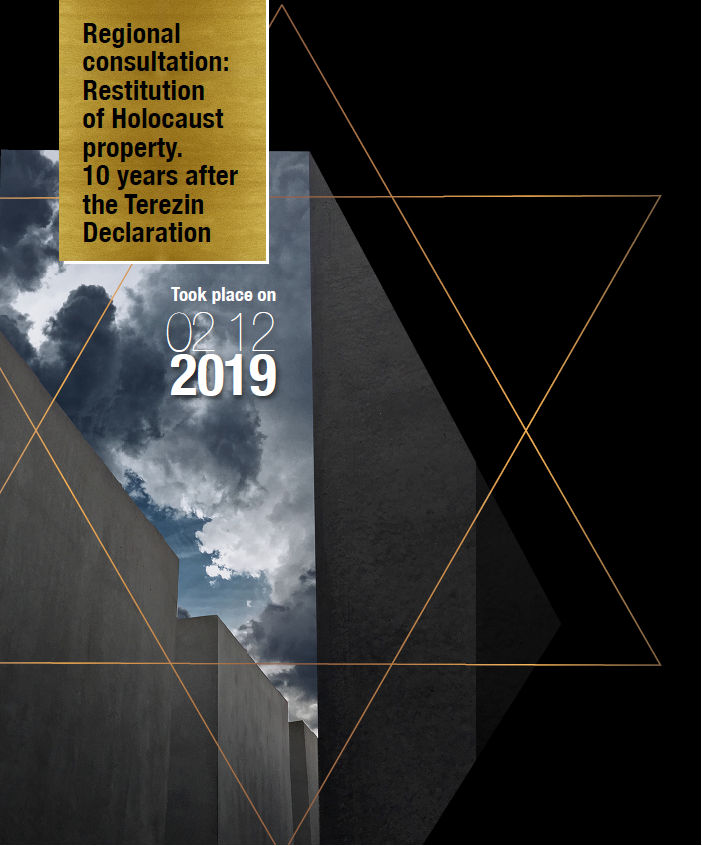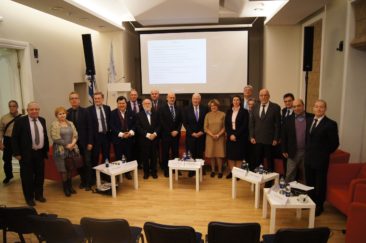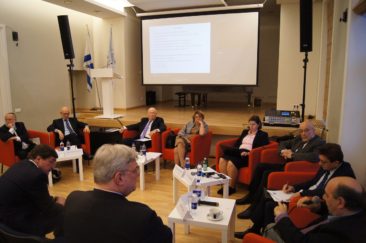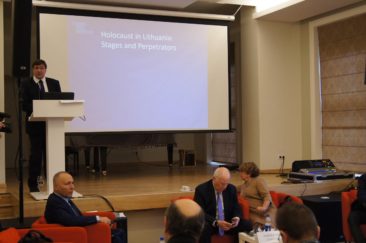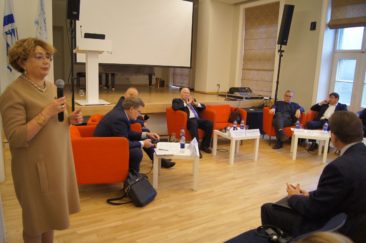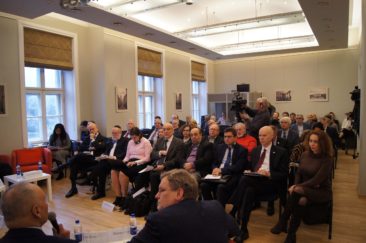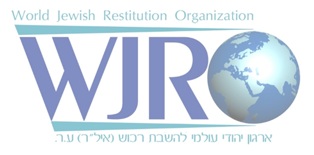
Hundreds of Lithuanian Jews and their Heirs Share €7.5 Million in One-Time Compensation Payments
(NY, NY, July 14, 2025): The Good Will Foundation (GWF) has completed the distribution of symbolic one-time compensation payments to Lithuanian Holocaust survivors and their heirs for private property wrongfully seized during the Holocaust and its aftermath. The World Jewish Restitution Organization (WJRO), which helped negotiate the original agreement and raise awareness about the application process, welcomes this meaningful step toward justice.
A total of €7.5 million was distributed among hundreds of eligible Lithuanian Holocaust survivors and certain heirs, with each approved applicant receiving a symbolic payment of approximately €20,000[1] per property claim. These payments were made possible through new legislation passed in December 2022, following years of advocacy to reopen the restitution process for those previously excluded due to citizenship restrictions under Lithuania’s original private property restitution law, which expired in 2001. The GWF, of which WJRO is a founding member, was designated to administer and distribute the payments.
“This is a profoundly important moment of recognition,” said Gideon Taylor, President, World Jewish Restitution Organization (WJRO). “These symbolic payments cannot undo the wrongs of the past, but they acknowledge the deep personal losses suffered by Lithuanian Jews and their descendants and help restore a measure of dignity that was stolen.”
Almost 1,000 applications were submitted to the GWF before the deadline on December 31, 2023. Throughout 2024, the GWF worked closely with government archives and land registries to verify property claims and identify eligible recipients. WJRO supported outreach efforts across Israel, North America, Europe, and beyond to ensure families were aware of the opportunity to apply.
For many recipients, the payments are deeply personal. “This compensation program is a powerful and long-overdue acknowledgment of what happened to my father and his family during the Holocaust,” said Mark, 63, a second-generation survivor from Irvine, California. “My father’s family owned several residential and commercial buildings in Siauliai, Lithuania, including houses and business facilities. These properties – and the lives connected to them – were stolen during the Holocaust. While this symbolic payment cannot undo that loss, it affirms that the suffering and injustice endured by my family and all Lithuanian Jews will not be forgotten. I am honored to help preserve my father’s legacy and to share this recognition with generations of our family.”
In another case, Rodney, 74, a filmmaker from Sydney, Australia, said, “The compensation payment made by the Good Will Foundation is a meaningful acknowledgment of the injustices my family endured. My great-grandparents, Avraham and Rachel, owned a house and factory for dyeing wool and cloth in Zagare, Lithuania. When they were murdered in October 1941, their property was taken and never acknowledged – until now. This symbolic payment recognizes both the loss of their property and the vibrant Jewish life that was destroyed. I’m pleased to share this moment with family across Australia, Israel, England, France, and the U.S.”
In another case, Monica, 68, a London-based writer, curator, and academic, shared: ‘When we learned our family had been approved for this symbolic payment, we knew right away that we wanted to use it to honor the memory of those who perished and to support future generations. My grandfather co-owned a successful textile factory in Memel, which was seized when my family was forced to flee. Our family decided to donate the funds to a remarkable initiative in Lithuania called Camera Obscura, which is preserving and cataloguing pre-war photographs of Jewish life. It’s a way of reclaiming part of our history and ensuring it is never forgotten.”
In another case, George, 77, of Vancouver, Canada, shared: “My grandfather was a chemist and businessman who owned several buildings and operated a successful factory in Šiauliai, Lithuania. In 1941, he, my grandmother, and several of their children were murdered in a mass shooting. This symbolic compensation acknowledges their loss and the irreparable damage to our family and community. I’ve chosen to donate to the Vancouver Holocaust Education Centre to support their work in preserving our stories and educating future generations.”
“Each story behind these payments reflects a legacy of loss – and a step toward justice,” said Rabbi Andrew Baker, Director, International Jewish Affairs at the American Jewish Committee and Co-Chair of the Good Will Foundation. “This initiative represents the Lithuanian government’s symbolic commitment to acknowledging those losses.”
“We are proud to be able to provide these payments, and grateful to all those who applied and shared their family stories,” said Faina Kukliansky, Chairwoman, Lithuanian Jewish Community and Co-Chair of the Good Will Foundation. “This is about more than property – it is about identity, justice, and recognition.”
For further information or for those who wish to inquire about the appeals process, please contact the Good Will Foundation at info@gvf.lt or visit https://gvf.lt/en/payments.
Background
WJRO, the Jewish Community of Lithuania, and the Association of Lithuanian Jewish Religious Communities established the Foundation for the Lithuanian Jewish Heritage in 2005. In 2011, the Foundation launched the Good Will Foundation to distribute €37 million provided by the government under Lithuania’s Law on Good Will Compensation for the Real Estate of Jewish Religious Communities.
Since 2014, the GWF has supported religious, cultural, health care, and educational initiatives serving Jewish communal life in Lithuania. Approximately $1.1 million of the initial compensation was designated for symbolic payments to over 1,550 surviving Lithuanian Jewish Holocaust victims.
In accordance with the 2022 legislation, the GWF allocated €7.5 million to compensate individuals for private property claims. An additional €37 million will be distributed over the next seven years to support Jewish communal life, as a symbolic acknowledgment of heirless Jewish property – an issue recognized in the 2009 Terezín Declaration. While this compensation represents only a fraction of the original property’s value, it distinguishes Lithuania from many countries in the region that have yet to meaningfully address heirless property.
During World War II, the Nazis and local collaborators annihilated over 90% of Lithuania’s 220,000 Jews. Today, approximately 5,000 Jews live in Lithuania.
WJRO represents world Jewry in pursuing claims for the recovery of Jewish properties in Europe (outside of Germany and Austria). WJRO was established by leading world Jewish organizations to address the restitution of Jewish property and to remind the world that the time has come to redress the enormous material wrongs caused to European Jewry during the Holocaust.
Media Contacts:
Lisa Sherman-Cohen Eli Bardenstein
Director, PR/Communications, WJRO Bardenstein Communications
lisa.sherman-cohen@wjro.org.il eli.bardenstein@gmail.com
+1 646-485-2036 +972 52-311-2124
[1] In the event that the property was jointly owned by more than one original owner, one amount of symbolic compensation was shared between the eligible applicants for this property. In the event that several heirs applied for the same property, one amount of symbolic compensation was shared between the eligible applicants for this property.
Regional Consultation: Restitution of Holocaust Era Assets – Ten Years After the Terezin Declaration

In December 2019, the conference was held in Vilnius, Lithuanian Jewish (Litvak) Community (LJC), to commemorate the 10th anniversary of Terezin declaration, dedicated to solving Holocaust victims’ property restitution questions. The experiences of returning assets of European countries were reviewed. Participants of the event had the chance to meet well-known Holocaust historians, to hear their presentations, to get acquainted with the results of many years of research. Lithuanian speakers had the opportunity to present Lithuania’s situation and to define goals and objectives for the future.
Jewish Community leaders from Czech Republic, Poland, Latvia and Hungary participating in the conference spoke about property restitution problems and unfulfilled promises of their governments, procrastination of cases in their countries and the prospect of creating new laws regarding property restitution procedures.
In 2009, 47 countries signed Terezin declaration in Prague regarding the restitution principles of seized property of European Jews, Lithuania was among them.
In December 2021, an e-publication was published to commemorate this conference.
In her introductory speech to the e-publication, Faina Kukliansky, Chair of the LJC, states: “The question of restitution is not primarily a legal question, but a political, humanistic one. The Lithuanian state is obliged to recognize its responsibility as a state. We talk so much about the continuity of citizenship and the connection with the state, we discuss the restoration of citizenship, but we immediately forget everything when it comes to taking care of victims of the Nazis and returning what was once looted.”
The e-publication contains all presentations of the conference speakers. We invite you to read the e-publication:
Photos from the conference held on December 2019. ©Good Will Foundation
Ten years have passed since the Terezin Declaration on Holocaust Era Assets and Related Issues was approved by 47 countries. It announced a program of activities geared towards ensuring assistance, redress and remembrance for victims of Nazi persecution. Of special note is that participating countries emphasized the importance of providing restitution for communal and individual immovable property:
“Noting the importance of restituting communal and individual immovable property that belonged to the victims of the Holocaust (Shoah) and other victims of Nazi persecution, the Participating States urge that every effort be made to rectify the consequences of wrongful property seizures, such as confiscations, forced sales and sales under duress of property, which were part of the persecution of these innocent people and groups, the vast majority of whom died heirless”.
There has been significant but mostly partial progress in these efforts. This anniversary year provides an opportunity to highlight the successes and identify best practices as well as take note of areas that still need to be addressed.
The Good Will Fund of Lithuania, established to administer Jewish communal restitution funds, proposes to host a one-day consultation in Vilnius to commemorate the 10th anniversary of the Terezin Declaration. The consultation will bring together Jewish communal leaders, representatives of international Jewish organizations, and officials from the Lithuanian government and other interested countries. We look forward to sharing our respective experiences and devising strategies to advance our common goals.
Proposed content of the event:
- Official opening;
- Discussion of immovable private property restitution;
- Discussion of immovable Jewish communal and religious property restitution;
- Open discussion on related issues.
Proposed invitation list:
- Representatives of the World Jewish Restitution Organization and other International Jewish organizations;
- Ambassadors and Special envoys for Holocaust Issues from interested countries;
- Representatives of Litvaks living in Israel and other countries;
- Jewish community leaders and/or restitution foundation directors from countries in Europe and the Former Soviet Union;
- Representatives of the Lithuanian government.

